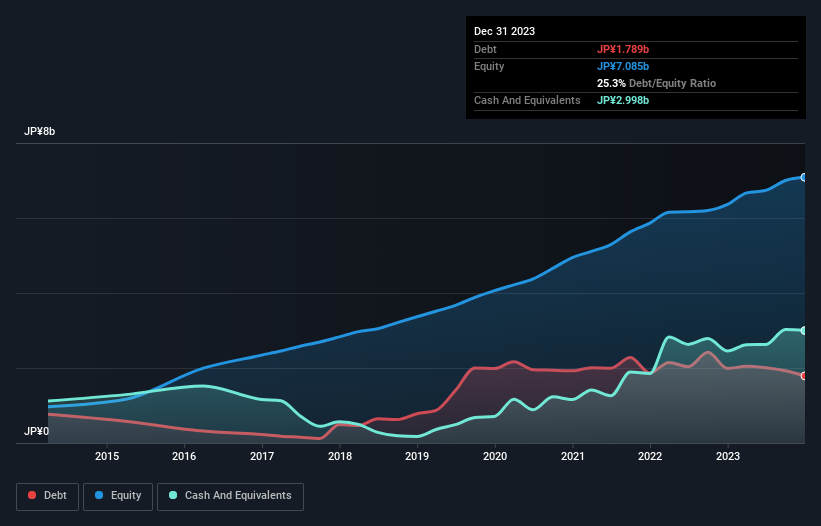Howard Marks put it nicely when he said that, rather than worrying about share price volatility, 'The possibility of permanent loss is the risk I worry about... and every practical investor I know worries about.' It's only natural to consider a company's balance sheet when you examine how risky it is, since debt is often involved when a business collapses. We note that BENEFIT JAPAN Co., Ltd. (TSE:3934) does have debt on its balance sheet. But should shareholders be worried about its use of debt?
Why Does Debt Bring Risk?
Generally speaking, debt only becomes a real problem when a company can't easily pay it off, either by raising capital or with its own cash flow. Ultimately, if the company can't fulfill its legal obligations to repay debt, shareholders could walk away with nothing. While that is not too common, we often do see indebted companies permanently diluting shareholders because lenders force them to raise capital at a distressed price. Of course, the upside of debt is that it often represents cheap capital, especially when it replaces dilution in a company with the ability to reinvest at high rates of return. The first thing to do when considering how much debt a business uses is to look at its cash and debt together.
View our latest analysis for BENEFIT JAPAN
What Is BENEFIT JAPAN's Debt?
You can click the graphic below for the historical numbers, but it shows that BENEFIT JAPAN had JP¥1.79b of debt in December 2023, down from JP¥1.99b, one year before. However, its balance sheet shows it holds JP¥3.00b in cash, so it actually has JP¥1.21b net cash.

A Look At BENEFIT JAPAN's Liabilities
Zooming in on the latest balance sheet data, we can see that BENEFIT JAPAN had liabilities of JP¥3.26b due within 12 months and liabilities of JP¥706.0m due beyond that. On the other hand, it had cash of JP¥3.00b and JP¥6.56b worth of receivables due within a year. So it actually has JP¥5.59b more liquid assets than total liabilities.
This surplus liquidity suggests that BENEFIT JAPAN's balance sheet could take a hit just as well as Homer Simpson's head can take a punch. With this in mind one could posit that its balance sheet means the company is able to handle some adversity. Simply put, the fact that BENEFIT JAPAN has more cash than debt is arguably a good indication that it can manage its debt safely.
Fortunately, BENEFIT JAPAN grew its EBIT by 7.7% in the last year, making that debt load look even more manageable. When analysing debt levels, the balance sheet is the obvious place to start. But it is BENEFIT JAPAN's earnings that will influence how the balance sheet holds up in the future. So if you're keen to discover more about its earnings, it might be worth checking out this graph of its long term earnings trend.
Finally, a company can only pay off debt with cold hard cash, not accounting profits. While BENEFIT JAPAN has net cash on its balance sheet, it's still worth taking a look at its ability to convert earnings before interest and tax (EBIT) to free cash flow, to help us understand how quickly it is building (or eroding) that cash balance. During the last three years, BENEFIT JAPAN produced sturdy free cash flow equating to 60% of its EBIT, about what we'd expect. This free cash flow puts the company in a good position to pay down debt, when appropriate.
Summing Up
While we empathize with investors who find debt concerning, you should keep in mind that BENEFIT JAPAN has net cash of JP¥1.21b, as well as more liquid assets than liabilities. So we don't think BENEFIT JAPAN's use of debt is risky. There's no doubt that we learn most about debt from the balance sheet. But ultimately, every company can contain risks that exist outside of the balance sheet. We've identified 1 warning sign with BENEFIT JAPAN , and understanding them should be part of your investment process.
When all is said and done, sometimes its easier to focus on companies that don't even need debt. Readers can access a list of growth stocks with zero net debt 100% free, right now.
Valuation is complex, but we're here to simplify it.
Discover if BENEFIT JAPAN might be undervalued or overvalued with our detailed analysis, featuring fair value estimates, potential risks, dividends, insider trades, and its financial condition.
Access Free AnalysisHave feedback on this article? Concerned about the content? Get in touch with us directly. Alternatively, email editorial-team (at) simplywallst.com.
This article by Simply Wall St is general in nature. We provide commentary based on historical data and analyst forecasts only using an unbiased methodology and our articles are not intended to be financial advice. It does not constitute a recommendation to buy or sell any stock, and does not take account of your objectives, or your financial situation. We aim to bring you long-term focused analysis driven by fundamental data. Note that our analysis may not factor in the latest price-sensitive company announcements or qualitative material. Simply Wall St has no position in any stocks mentioned.
About TSE:3934
Flawless balance sheet, good value and pays a dividend.
Market Insights
Community Narratives



